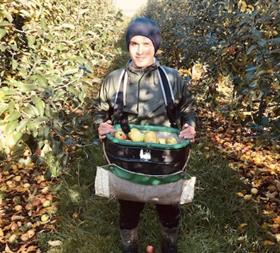
Kent growers Chandler and Dunn have harvested over 150,000 surplus apples for redistribution.
Working with partners Worldwide Fruit and The Bread and Butter Thing (TBBT), the company's fruit will go to over 24,000 families through TBBT’s affordable food service as well as other projects including Christmas HAF schemes and council winter support projects across the north of England.
Every autumn there is fruit left on farmers’ trees that hasn’t been harvested for a retailer due to it being too big, too small or not the right colour. Usually it is picked for juicing or used as animal feed, and harvesting this fruit is known as the ‘final pick’, or the last of the season.
Chandler and Dunn’s two Kent farm sites include 200 hectares of orchards, and they are one of Worldwide Fruit’s key UK suppliers of apples.
As part of Worldwide Fruit’s recent partnership with TBBT, the international fruit distributor is continuing to look for new opportunities to reduce the waste of its edible surplus, using it instead for social purposes. It is working with its partners to examine elements of its supply chain that generate surpluses which can be eliminated as part of its sustainability drive and net-zero aspirations.
The first stage of this was to work with Chandler and Dunn to arrange a ‘final pick’ at the end of the fruit season, with almost 24 tonnes of apples supplied to TBBT.
As a result of the partnership, the charity has now received almost half a million pieces of fruit since the summer.
Andy Mitchell, senior technical manager at Worldwide Fruit, said: “We’re working closely with all our suppliers to ensure that we do everything we can to minimise the waste of our edible surplus. None of our growers want to see their crops wasted and no-one sets out to grow food that won’t be eaten. So this is an important step forward. We know that wasted surplus fruit adds to CO2 emissions and we explore all aspects of our work to ensure that we tread softly on the planet we grow on.”
Mark Game, chief excecutive at TBBT, added: “We thrive through working collaboratively and with partners who think outside the apple crate and are willing to be flexible in their approach to food surplus. This dynamism and innovation will help us all maximise the benefits of surplus food and support people across the UK who struggle with access to healthy, affordable fruit.”



